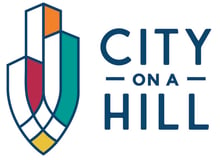In 1863, a brick farmhouse on this hilltop property was purchased by Christians and converted to a hospital to care for the sick and the poor. Thus, beginning a long history of faith-based solutions emanating from this location. In the mid-1990s, a huge hospital on the near west side of Milwaukee was closed, adding to the blights in an area already marked by poverty, unemployment, addiction and crime.
Then in August 2000, Convoy of Hope, a national relief organization, brought in semi-truck loads of food for a community outreach event co-sponsored by dozens of churches and the Urban Ministry Center of the Assemblies of God – the forerunner of City on a Hill. In one day they provided 8,000 residents with a meal, groceries, a job fair, health services, children’s games, haircuts, music and the gospel.
Impressed by the event and concerned about the neighborhood’s decline, the hospital’s owners began a dialog with the local coordinating agency. Four months later Aurora Health Care donated six large buildings to this neighborhood making room for what became City on a Hill. A faith-based collaborative model of service that restores hope, reduces poverty, strengthens neighborhoods, and works for social justice.
Beginning in 2001, City on a Hill used demographic analysis, interviews with community leaders, and a neighborhood outreach strategy called Adopt-a-Block to identify unmet needs of families in the surrounding neighborhoods.
Since then, we have built relationships with residents, developed a wide range of programs to meet their needs, leased space to other nonprofits to supplement our services, and facilitated the development of 150 units of affordable housing for families and senior citizens on our campus to help revitalize this neighborhood.
Today, our staff and more than 1,300 volunteers annually impact the lives of thousands of children, teens and adults. We use a unique holistic, comprehensive approach that addresses the root causes of poverty including, spiritual, mental, financial, educational, relational and health needs.
